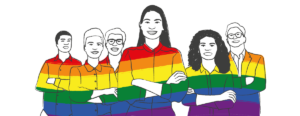A central feature of inclusive leadership is the capacity to understand the people you lead, and empathise with their experiences. That’s hard to do from a distance.
Most of us will have LGBT employees, in many cases in large numbers, and any effort to be inclusive of them will necessarily begin by listening to them. But if people do feel excluded or uncomfortable – and sadly this is still the case for many – then you can’t necessarily expect them to be open about their experiences when the boss comes calling.

Books provide a unique window into other people’s lives and perspectives, and in this instance into the often little-known history and vital context of the LGBT rights movement. So here are five reading suggestions, ranging from poignant memoirs to practical guides to inclusive leadership.
1. The Glass Closet: Why Coming Out is Good for Business By John Browne
Picture this today: the longstanding chief executive of one of Britain’s largest companies gets a call from the Mail on Sunday, telling him they plan to out him as gay; he seeks an injunction, but has to resign after it’s revealed he lied to the court about how he met his partner. That was 2007.
Much has changed since then, thankfully, but Browne – who vividly describes how exhausting and distracting it is to pretend to be someone else at work – makes a powerful case that much more still needs to be done to tackle homophobia.
2. Straight Jacket: Overcoming Society’s Legacy of Gay Shame By Matthew Todd
The former editor of Attitude magazine delivered this award-winning book in 2018, a mash-up between a self-help guide and a polemic that was described as “essential reading for every gay person on the planet” by Elton John, no less, and “a resource for anyone with an interest in knowing what needs to change to bring about real equality” by the Evening Standard.
One of the main takeaways for inclusivity-minded leaders is around the internalised “gay shame” that many LGBT people still sadly carry around with them, even if their current environment, for example at work, is no longer obviously homophobic.
3. True Colours: My Life as the First Openly Transgender Officer in the British Armed Forces By Caroline Paige
Caroline Paige had been an RAF officer for 19 years when she finally came out as trans. There weren’t any other openly transgender people in any branch of the British armed services, partly because of deeply bigoted attitudes, and partly because at the time it was still technically illegal.
In this eloquent memoir Paige reveals what it was like living behind a masquerade, sharing her delight and surprise at how supportive her peers and commanding officers were during her transition and subsequent 16 years in uniform, and offering hard-learned advice on how even traditional organisations can create inclusive cultures.
4. Stonewall: The Definitive Story of the LGBTQ Rights Uprising that Changed America By Martin Duberman
When you think of the civil rights movements of the postwar period, you’ll probably think of the campaign for racial equality led by Martin Luther King and Malcolm X. But another movement began in that decade, at the Stonewall Inn, a gay bar in New York City, when a police raid prompted a riot and eventually a wider conversation in society.
This compelling piece of history provides essential context to the gay rights struggle, including the origin of the Pride marches, and serves as a chilling reminder of just how openly homophobic society was within in living memory.
5. The Pink Line: The World’s Queer Frontiers By Mark Gevisser
There has been tremendous progress in attitudes towards LGBT people over the last decade, and that’s worth celebrating. But don’t take it for granted. As South African journalist Mark Gevisser makes very clear in this moving yet scholarly book, the story is not the same for everyone, everywhere. As he writes, while 88% of Spaniards and 60% of Americans believe society should accept homosexuality, the figure is only 2% for Nigeria, Egypt and Pakistan.
Tracing the stories of people like Pasha, a trans woman in Russia, and Ugandan refugee Michael, Gevisser explores how gay rights has divided the world, and just how far is has to go.
















